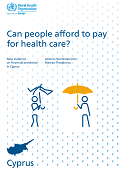Can people afford to pay for health care? New evidence on financial protection in Cyprus (2021)

Download
By Antonis Kontemeniotis, Mamas Theodorou
2021, xiv + 86 pages
ISBN 978 92 890 55390
This publication is only available online.
This review is part of a series of country-based studies generating new evidence on financial protection in health systems in Europe. Financial protection is central to universal health coverage and a core dimension of health system performance.
Catastrophic health spending in Cyprus is heavily concentrated among the poorest households. It disproportionately affects older people and those who rely on publicly financed health services. Although the incidence of catastrophic health spending is higher in Cyprus than in many other European Union countries, it is surprisingly low when compared to countries with similarly high levels of out-of-pocket payments. This may be due to the near total absence of user charges (co-payments) for publicly financed health services for over 80% of the population until 2013.
Policy responses to the 2008 economic crisis led to a lasting decline in public spending on health and widened gaps in coverage. This is likely to have contributed to the increase in unmet need for health and dental care and catastrophic spending in the years following the crisis.
The General Health System launched in 2019 represents a major step towards universal health coverage in Cyprus. It is expected to reduce unmet need and financial hardship by covering the whole population, improving protection from co-payments and addressing issues around health care quality and waiting times. To achieve this, the new system will need to continue to strengthen the purchasing of health services and ensure that public spending on health increases at a steady pace.



